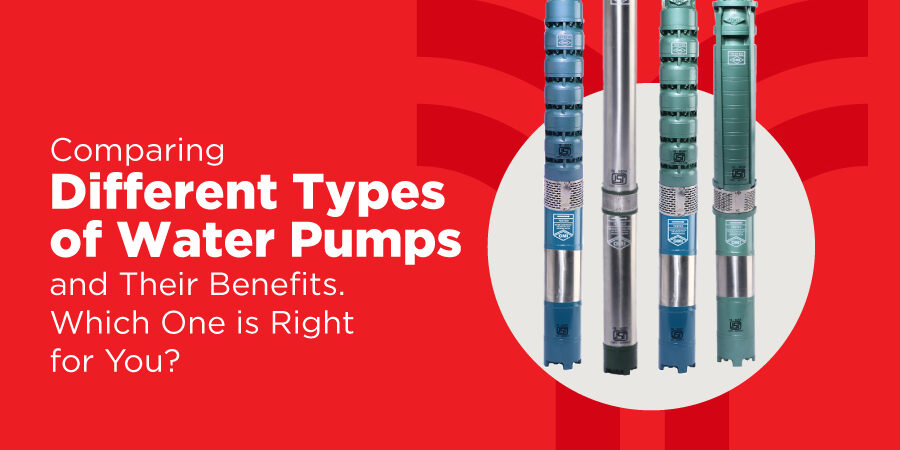Comparing Different Types of Water Pumps and Their Benefits. Which One is Right for You?
Water pumps are essential devices in a variety of uses including agriculture, industry, residential use, and emergency circumstances. These adaptable instruments are perfect for drainage, irrigation, and more because they are made to transfer water effectively. There are so many options in the market from top water pump manufacturers, selecting the best type of water pump can be difficult. It’s essential to understand how these pumps differ in order to guarantee the best possible performance and efficiency for your particular requirements. We’ll go over the many kinds of water pumps, their benefits and drawbacks, and which one might be the best option for you in this extensive blog.
Types of Water Pumps
Submersible Pumps
Submersible pumps are designed to be submerged in the water source, typically deep inside the borewell. Because they push water to the surface instead of dragging it, these pumps have a very high efficiency. They are perfect for applications requiring substantial water delivery since they can function at higher pressures and are appropriate for deep borewells.
Advantages
- Direct immersion in water ensures efficient operation.
- Suitable for deep wells.
- More silent than surface-mounted pumps.
- Minimal maintenance is required.
Disadvantages
- The initial cost is higher than that of surface pumps.
- Professional assistance may be needed for installation and recovery.
- Limited to use when the borewell is deep enough to allow submersion.
Jet Pumps
Jet pumps also referred to as surface pumps, are positioned above ground and use suction to extract water from the borewell. These pumps are suitable for small to moderately deep borewells because they use centrifugal force to draw water to the surface. To meet diverse pumping needs, jet pumps come in a variety of forms, such as single-stage and multi-stage designs.
Advantages
- Cheaper than submersible pumps.
- Simple maintenance and installation.
- Ideal for borewells that are small to moderately deep.
- Can be used with wells of varying diameters.
Disadvantages
- Less efficient than submersible pumps, particularly in deep borewells.
- Limited to applications in areas with relatively high water tables.
- Prone to cavitation if the suction lift is too high.
Open-well Pumps
Open-well pumps are used to draw water from open wells, which are typically shallow and have large diameters. These pumps are positioned at the bottom of an underground tank or reservoir and powered by the power grid and are commonly used in rural and agricultural areas where groundwater levels are relatively high.
Advantages
- Suitable for extracting water from open wells or reservoirs.
- Versatile and can be used in various agricultural and domestic applications.
- Easy to install and maintain.
- Cost-effective compared to borewell pumps.
Disadvantages
- Limited to applications where surface water sources are available.
- May require additional filtration or treatment for potable water use.
- Not suitable for areas with fluctuating water levels or where borewells are the primary water source.
Centrifugal Pumps
Centrifugal pumps are versatile and widely used devices for transferring fluids by converting rotational kinetic energy to hydrodynamic energy. These pumps, which are usually installed above ground, pull fluid into the pump and force it out under pressure using a revolving impeller. Centrifugal pumps are suitable for a variety of applications, including water supply, irrigation, and industrial processes.
Advantages
- Versatile and suitable for various borewell applications.
- Available in both surface and submersible configurations.
- Efficient operation with minimal maintenance requirements.
- Can handle high flow rates and pressures.
Disadvantages
- May require priming for surface installations.
- Efficiency decreases with increasing depth in surface pump configurations.
- Initial cost and installation complexity vary depending on the pump type and configuration.
Choosing the Right Water Pump
The following considerations play a role in choosing the best water pump. To assist you in making an informed choice, take into account the following:
Water Requirements
Choose a pump that can satisfy your needs by evaluating your water requirements, including flow rate and pressure. When calculating the pump capacity, take into account elements like industrial applications, residential water supply, and irrigation.
Power Source
Consider the power source’s dependability and accessibility when running the pump. While surface pumps can be powered by solar energy, diesel, or electricity depending on the situation and requirements, submersible pumps need electricity to function.
Quality
When selecting a pump, quality is crucial. It has an impact on dependability, efficiency, and durability. For longer-lasting pumps, choose those composed of premium materials like stainless steel. Select brands like Torren Pumps that are well-known for their dependability and client service. For protection against water damage, look for effective motors with adequate sealing. Verify adherence to safety certificates and standards.
Budget
Assess your financial limitations and contrast the purchase price, installation charges, and ongoing maintenance costs of various pump solutions. Submersible pumps may cost more initially, but over time, they frequently provide improved efficiency and dependability.
Selecting the appropriate submersible motor for home is crucial to guaranteeing effective water extraction and fulfilling your unique needs. Knowing the distinctions between open well pumps, jet pumps, submersible pumps, and centrifugal pumps will help you make a smart decision. Whether you need a pump for industrial, residential, or agricultural irrigation, choosing the right kind will maximize performance and provide dependable water delivery for many years to come.


